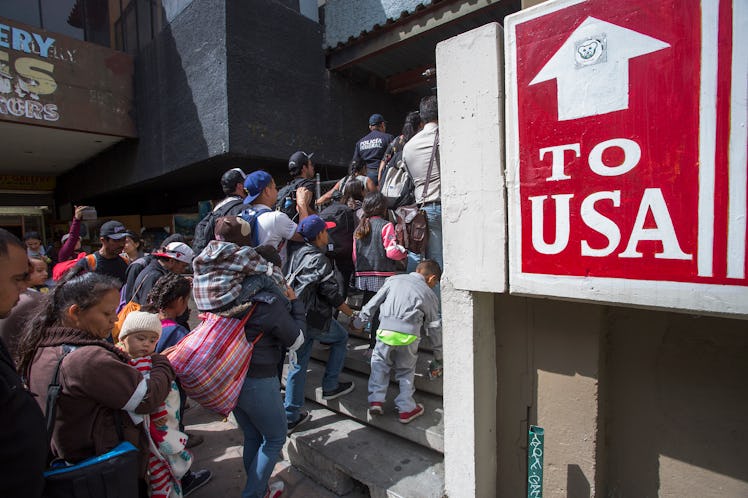
Getting Asylum Is A Lot Harder Under Trump's New "Zero Tolerance" Policy
President Donald Trump's enforcement of his new "zero tolerance policy" along the southern U.S. border raises many questions, one of the biggest ones being whether seeking asylum is legal or not as a result of the new law. So, does "zero tolerance" mean that absolutely no person entering the United States without documentation will be able to legally enter the country — or can immigrants still escape persecution using this decades-old protection policy? Well, Trump can't get rid of asylum law, but this policy isn't making it any easier.
The United States has a legal obligation to provide asylum to individuals that qualify as refugees and make their claim on U.S. soil, thanks to the the 1967 U.N. Protocol and the Refugee Act of 1980. "Asylum" essentially means that a person is looking to enter a country without proper documentation, as a refugee, in order to escape a dangerous situation in their home country. According to the United Nations Refugee Agency (UNHCR), a refugee is defined as a person that's been forced or felt the need to flee their home country because of "race, religion, nationality, political opinion or membership in a particular social group." Asylum seekers must present a "credible fear" of persecution or torture on account of one of those factors, if returned to their home country.
So, yes — seeking asylum is definitely legal. But that doesn't mean it's easy. According to USA Today, the asylum-seeking process could take years because of the Department of Homeland Security's (DHS) royally backlogged system.
And the Trump administration has been making it even harder. Under the "zero tolerance policy," announced by Attorney General Jeff Sessions in early April, asylum seekers crossing the U.S.-Mexico border must make their claim at ports of entry, or risk prosecution and potential separation from any children they're traveling with. As Sessions explained the policy, "If you cross this border unlawfully, then we will prosecute you." The problem is that requesting asylum at a port of entry is not as easy as he makes it sound, as AZ Central points out. Asylum seekers are reportedly met with waits as long as five days to make a claim, or even officials turning asylum seekers away.
What's more, on June 11, Sessions announced that the U.S. would no longer be granting asylum to those fleeing domestic violence or gang violence — a major shift, since many of those seeking asylum from Central America are fleeing the region's enormous gang violence problem, in which sexual violence and domestic abuse are frequently used as tactics of fear or coercion. Sessions said,
The mere fact that a country may have problems effectively policing certain crimes — such as domestic violence or gang violence — or that certain populations are more likely to be victims of crime, cannot itself establish an asylum claim.
These changes are all part and parcel of the Trump administration's major overhaul of immigration policy with the "zero tolerance" change, including the choice to prosecute all those entering the country without documentation (and not making an asylum claim at a port of entry), thus separating them from their children as the adults go through the criminal courts. The policy changes have been heavily criticized, with all five living first ladies denouncing the policies that separate children from their families, and images of immigrant children in cages going viral.
So what's next for asylum seekers? Well, at the very least, just keep hoping. And in the meantime for the rest of us, you can always call your congressperson or senator and let them know what you think of Trump's policies and the legislation in the works. It can never hurt.